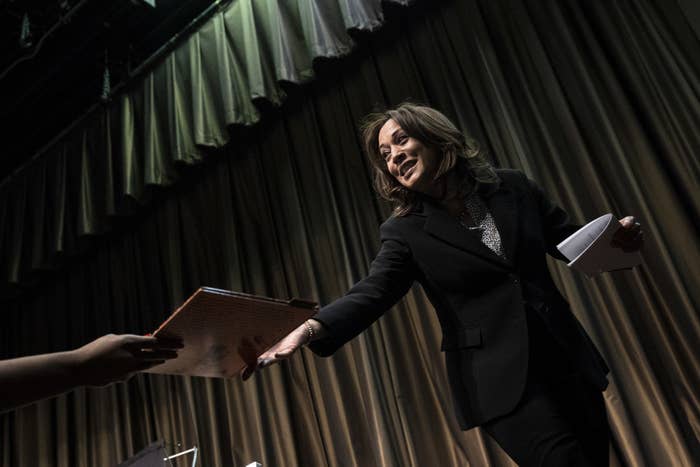
Kamala Harris made a direct appeal to black Americans with her proposal to increase teacher pay on Friday, framing her desire to raise wages for educators as a path to attract young black people to the profession who would otherwise opt to pursue more lucrative careers.
Harris’s pitch came at the National Action Network’s annual convention in New York City. Flanked by the Rev. Al Sharpton, Harris made some of her most pointed remarks, separating herself from the packed field of 2020 candidates running for president as a proven leader whose track record reflected a measured and steady regard for the well-being of black Americans. Her address spent several minutes on her plan for teachers, a $315 billion proposal her campaign said will be funded by “strengthening” the estate tax.
“When we close that gap around teacher pay, all communities will benefit,” Harris said Friday. “But specifically, also, we must acknowledge that the statistics and data is clear, that when a black child has a black teacher by third grade, it makes that child 13% more likely to go to college. If that black child has two black teachers, they are 32% more likely to go to college.”
Harris backed her proposal with a study published last November, which found that black teachers in classrooms helped improve educational outcomes for students. The study found that black teachers are more likely than white teachers to raise the expectation level for black students, and was part of a broader 2017 study that found poor black students were less likely to drop out of high school if they had a black teacher in the third, fourth, or fifth grade.
“The role model effect seems to show that having one teacher of the same race is enough to give a student the ambition to achieve, for example, to take a college entrance exam,” coauthor Nicholas Papageorge said. “But if going to college is the goal, having two teachers of the same race helps even more.”
“I want some young student at Morehouse or Howard who is excelling in science to be able to follow their passion and go teach in the neighborhood middle school and not worry about how they’re going to put food on their own table or pay their bills,” Harris said Friday. “I want that child — that young student at Spelman or South Carolina State who is excelling in math — to be able to go and teach in elementary school and not worry about how she’s going to pay her bills so she needs to go to Wall Street, or that science student feels like they need to go work for a pharmaceutical company. We need to get our priorities straight in this country.”
A standing room–only crowd listened intently to Harris, whose speech was perhaps the most anticipated of the presidential candidates: In nearly a dozen interviews with attendees, Harris was near or at the top of the list of candidates people wanted to hear from as voters sought to make their minds up in a crowded field.
Harris, though, has also received criticism on the left for her record as a prosecutor in California. Sharpton asked her, as he has all of the candidates who spoke to the convention, about whether she’d support consent decrees between the Justice Department and local law enforcement entities.
“You can look at my track record to know that’s what I would do, because that’s what I did when I ran the California Department of Justice,” said Harris, talking about her law enforcement experience in more assertive terms. “And I think as folks make decisions these days, it has to be not only based on speeches that people give, but it has to be based on what they have proven as an ability to do, and I have done it. Leaders need to lead and come up with the solutions,” she said.
The audience let out a big roar when Sharpton asked if Harris would sign Sheila Jackson Lee’s bill supporting a commission to study reparations, if she’s elected president. “When I am elected president I will sign that bill,” she said.
